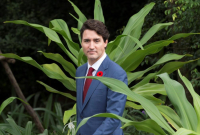The president of the Philippines has told his military commanders to cancel a controversial deal to buy 16 helicopters from Canada, after the Trudeau government ordered a review of the contract over human-rights concerns.
President Rodrigo Duterte issued the order at a news conference Friday in which he said that he respected Canada's position, but also lashed out against restrictions on the use of military equipment against terrorist and rebels.
"I am sure Canada is a bright boy. But the terrorists, ISIS, are contaminating the locals. And if I cannot use the gunships, the helicopters, then I might as well surrender this government to them," Duterte said in Manila.
"I do not question your logic. Your logic is your logic. My logic is mine. It's based on the reality on the ground. So henceforth, this is a direct order to the commander in chief of the armed forces of the Philippines and the police."
The decision sparked a surprisingly sharp response from the Trudeau government, which only a few days earlier had been defending the deal, which would have been worth an estimated $300 million.
"The president's troubling comments only underscores the confusion and contradictions that have emerged recently on the intended end use of the helicopters," International Trade Minister Francois-Philippe Champagne said in a statement.
"That is precisely why I ordered a review and that process will continue."
The government had initially said the Bell helicopters would only be used for search-and-rescue and disaster relief operations, and that the deal would support about 1,000 jobs in the Montreal area.
But Champagne ordered a review this week after a senior member of the Philippine military said the aircraft would be used for "internal security operations," sparking concern among civil society groups.
The Philippines military has been accused of extrajudicial killings, torture and other rights abuses during its separate conflicts with Islamic State-linked terrorists and communist rebels.
Prime Minister Justin Trudeau also raised concerns about extrajudicial killings while visiting the country in November, specifically those related to Duterte's violent crackdown on illegal drugs.
The helicopter deal was quietly facilitated by the Canadian Commercial Corp., a Crown corporation whose role includes selling Canadian-made arms to foreign countries on behalf of the government.
It was only made public when the Philippines military revealed the purchase; Champagne has said the contract was signed under the auspices of a previous agreement and that neither he nor any other ministers were asked to sign off on it.
Human-rights and arms-control groups have long questioned the CCC's process for assessing the potential risk of rights abuses in the sale of arms to countries with questionable records such as Saudi Arabia.
The CCC has refused to comment on the deal other than to confirm that a contract was signed in late December.
Bell Helicopter declined to comment Friday on Duterte's decision.
Quebec Premier Philippe Couillard said in Saguenay, Que., that he was disappointed with word of the cancelled contract, in particular for employees who he said must be worried at the news.
Couilllard said Bell's Mirabel, Que., installation is a successful operation that could continue to count on the province's support.
Duterte, meanwhile, said he did not want to buy any "weapons of war" from Canada because "they will invariably be used against the rebels and the terrorists."
He also said not to buy from the U.S. "because there is always a condition attached."





Comments